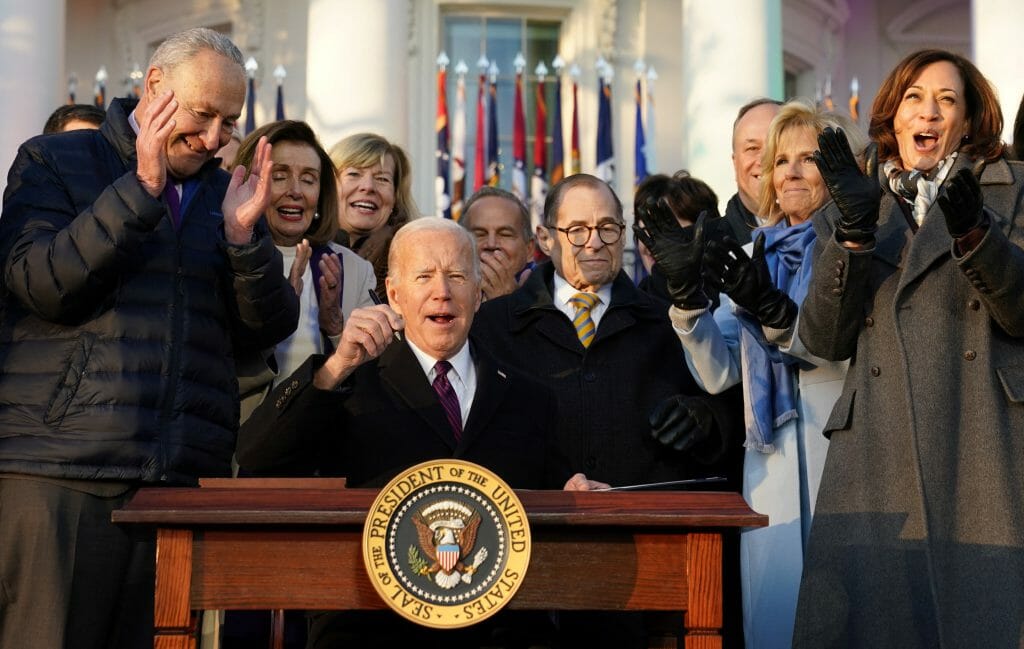President Joe Biden signed The Respect for Marriage Act into law today. The landmark law grants federal protections for same-sex and interracial couples, and was passed with bipartisan support in Congress.
The signing took place on the South Lawn of the White House before an audience of invited guests. The jubilant celebration included longtime LGBTQ rights activist Cyndi Lauper (pictured below in the White House press briefing prior to the signing ceremony) performing “True Colors” in front of thousands of well-wishers on the White House lawn, pausing at the end to allow the crowd to sing “true colors are like a rainbow… beautiful.”
“Marriage is a simple proposition. Who do you love? And will you be loyal to that person you love?” President Biden said, marking the moment. “It’s not more complicated than that.” This new law, he said, recognizes that “everyone should have the right to answer those questions for themselves without the government interference,” and secures the federal “protections that come with marriage.”
The law is one of the very first pieces of legislation passed by Congress and signed by the President that explicitly provides protections for LGBTQ people. The Respect for Marriage Act annuls the Defense of Marriage Act, which defined marriage as between a man and a woman. It mandates that every state must honor any and all marriages legally performed in any part of the United States, including those performed in other states or territories. In addition to protections for same-sex unions, the new law also protects the marriages of interracial couples.
Sarah Kate Ellis, President and CEO of GLAAD said, “Today, as it always does, love wins. The new law will protect LGBTQ Americans and couples of different races, and their families, recognizing that they and their marriages are as loving and worthy of recognition as any other couple. GLAAD is proud to be among all those at the White House celebration today who helped achieve this milestone and continue to fight for equality, freedom, and acceptance for every LGBTQ person.”
The Respect for Marriage Act passed in the House with a vote of 258 to 169 with 39 Republicans joining the Democrats voting in favor, after getting through the Senate with the support of 12 Republican senators. At the time of the bill’s passage in the House, the vote was cheered with loud applause in the chamber when the vote was gaveled to a close.
As a U.S. Senator, Biden voted for the Defense of Marriage Act in 1996, but as vice president, he was explicit in his support of same-sex unions, marking his own evolution on the issue, in an interview on NBC’s “Meet the Press.” His statement in support of marriage equality was unplanned, he says, but proved to be a major turning point in American politics after which President Obama supported a similar position shortly thereafter. Many national leaders followed suit.
Public support for same-sex marriage has continued to increase in recent years. A clear majority of 71% of Americans support marriage equality acording to a 2022 Gallup poll (up significantly from 1996 when Gallup first polled about same-sex marriage in 1996—only 27% supported legal same-sex unions). But as the Supreme Court overturned the long-settled precedent of Roe v. Wade, and Associate Justice Clarence Thomas suggested that Obergefell should be overturned as well, a groundswell of support from the public and pro-equality elected officials pushed for federal protections for same-sex and interracial marriage.

CNN reports that guests at the bill signing included, “Judy Kasen-Windsor, widow of gay rights activist Edie Windsor; Matthew Haynes, co-owner of Club Q, the LGBTQ club in Colorado Springs where a gunman last month killed five people in a mass shooting; Club Q shooting survivors James Slaugh and Michael Anderson; and a number of plaintiffs from cases that culminated in the landmark civil rights case Obergefell vs. Hodges, in which the Supreme Court ruled in 2015 that same-sex couples can marry nationwide.”
About GLAAD: GLAAD rewrites the script for LGBTQ acceptance. As a dynamic media force, GLAAD tackles tough issues to shape the narrative and provoke dialogue that leads to cultural change. GLAAD protects all that has been accomplished and creates a world where everyone can live the life they love.













